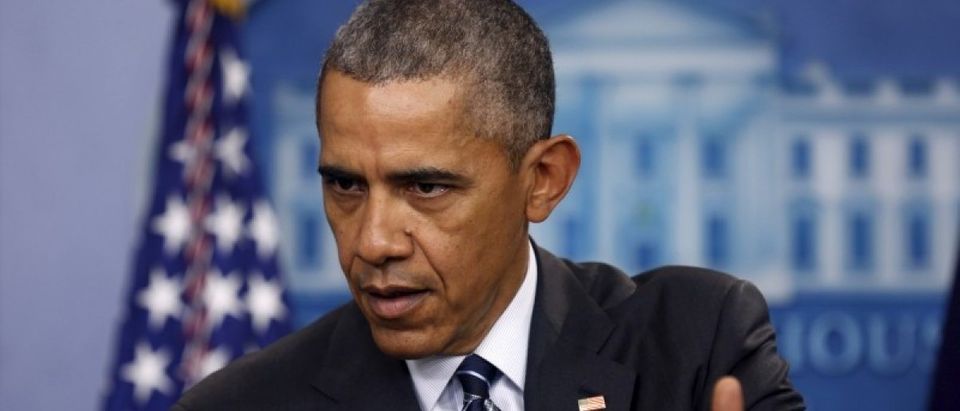Following his meeting with financial regulators Monday, President Barack Obama released a statement in defense of regulations, like Dodd-Frank, aimed at preventing another financial crisis – a sentiment Treasury Secretary Jack Lew doubled down on at a Senate Appropriations hearing Tuesday.
Meanwhile, several economists argued that, not only is Obama’s assumption on the preventative nature of these regs misplaced, those same regs might have hindered economic recovery and unfairly landed on the little guy’s bottom line.
According to Todd Zywicki, the executive director of the George Mason Law & Economics Center, Dodd-Frank has had detrimental effects on small banks and credit unions, while failing to eliminate the problem of “too big to fail.”
“Although Dodd-Frank has entrenched the too-big-to-fail position of mega-banks, it has been ruinous for small community banks and credit unions,” he told The Daily Caller News Foundation. “The huge regulatory cost imposed by Dodd-Frank has fallen proportionally harder on small banks than large banks.”
A Harvard Kennedy School study shows smaller banks have been shrinking at twice the rate in key lending markets. They’ve effectively exited mortgage lending altogether because of the regulatory risk and expense.
Norbert Michel, a research fellow on regulations at the Heritage Foundation, highlighted that government policies pushing people toward certain credit markets –as seen in the 90s with the attempt to increase home ownership rates – were responsible for the financial collapse.
The president slammed the media on both the left and right for saying “the crisis happened and nothing changed.”
“Nobody says nothing was done, we just say what was done was wrong,” Mark Calabria, director of financial regulation studies at the Cato Institute, told TheDCNF. “Even on the left, even Bernie doesn’t say nothing was wrong, he says what you did was insufficient and even Clinton says that, so [Obama] has certainly mastered the straw man during his time in Washington.”
The commander in chief touted the administration’s work to stop another crisis by creating the Consumer Financial Protection Bureau (CFPB) to crack down on “dishonest predatory practices,” moved derivative trading into clearinghouses, and applauded banks for having more capital.
Michel told TheDCNF moving derivative trading into clearinghouses has increased systemic risk because it concentrates risk all in one place – making too big to fail worse.
“All higher capital is going to do is lower the probability of default or raise the point at which the firm becomes insolvent.” he said. “It doesn’t mean there is a higher cushion there, they don’t hold capital, they are funded by capital.”
The research fellow said while the CFPB is working in a number of different areas, “virtually none of it had to do with the financial crisis.”
Despite criticisms of the landmark Wall-Street reform legislation passed in 2010, the president is pushing for implementation of more financial regulations, including the Department of Labor’s controversial fiduciary rule placing new standards on retirement advisers.
While the economists agree it may not have steep economic implications immediately, it will stifle long-term economic growth.
According to Calabria, the legal action advisers could face if money is lost through an investment recommendation will push financial planners to steer people toward an overly conservative approach.
“To grow the economy we need people to invest in equities and start-ups,” he said, adding that young people in particular should be investing in stocks versus bonds. “An economy that doesn’t take risks is an economy that doesn’t grow. If anything, I think we are going to be creating too much risk aversion among investors in a way that is going to slow economic growth.”
Members of Congress on both sides of the aisle have expressed concern the rule will prevent low-and-middle income Americans from seeking advice due to the initial proposal exposing them to fees they aren’t subjected to under the current policy.
Rep. Peter Roskam of Illinois has introduce legislation in the House offering an alternative to the rule, which would raise the standards on advisers without making advice entirely unattainable.
The lower chamber is expected to vote on the bill as soon as the final rule is released.
Follow Juliegrace Brufke on Twitter
All content created by the Daily Caller News Foundation, an independent and nonpartisan newswire service, is available without charge to any legitimate news publisher that can provide a large audience. All republished articles must include our logo, our reporter’s byline and their DCNF affiliation. For any questions about our guidelines or partnering with us, please contact licensing@dailycallernewsfoundation.org.


